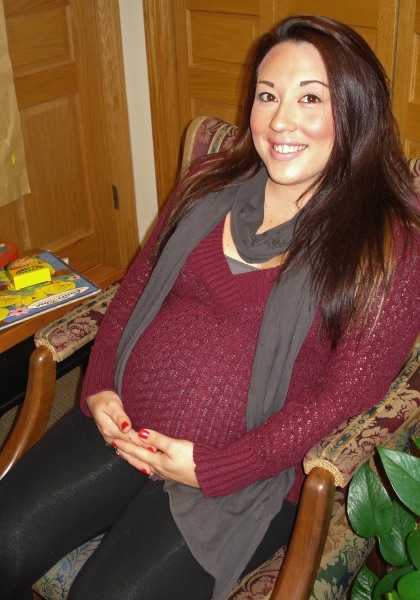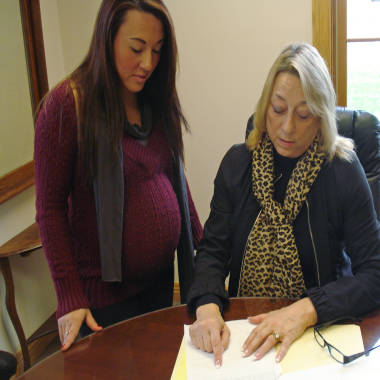 When Alicia
Beltran was 12 weeks pregnant, she took herself to a health clinic about
a mile from her home in Jackson, Wis., for a prenatal checkup. But what
started as a routine visit ended with Beltran eventually handcuffed and
shackled in government custody – and at the center of a
first-of-its-kind federal lawsuit challenging the constitutionality of a
state’s fetal protection law.
When Alicia
Beltran was 12 weeks pregnant, she took herself to a health clinic about
a mile from her home in Jackson, Wis., for a prenatal checkup. But what
started as a routine visit ended with Beltran eventually handcuffed and
shackled in government custody – and at the center of a
first-of-its-kind federal lawsuit challenging the constitutionality of a
state’s fetal protection law.On July 2, Beltran, 28, met with a physician’s assistant at West Bend Clinic at Saint Joseph’s Hospital in West Bend, Wis., for her prenatal visit. When asked to detail her medical history, Beltran admitted a past struggle with the painkiller Percocet. But that was all behind her, Beltran said: She had been taking Suboxone, a drug used to treat Percocet dependency. Lacking health insurance and unable to afford the medication, Beltran had used an acquaintance’s prescription and self-administered the drug in decreasing doses. She had taken her last dose a few days before her prenatal visit.
According to Beltran, the physician’s assistant recommended she renew her use of Suboxone under a doctor’s supervision. After Beltran declined, she said she was asked to take a drug test, which was negative for all substances except Suboxone.
Two weeks later, a social worker visited Beltran at home and told her that she needed to continue Suboxone treatment under the care of a physician, said Beltran, who again declined. Two days later, Beltran found police officers at her home, who arrested and handcuffed her.
According to the police report, the officers took Beltran to a hospital, where she underwent a doctor’s exam. Her pregnancy was found to be healthy and normal, her lawyers say. Police then took her to Washington County Jail to await a hearing – hours later, she was led into a courtroom, handcuffed and shackled at the ankles, where a county judge ordered her to spend 90 days in a drug treatment center.
“Alicia had no idea she was giving information to the physician’s assistant that would ultimately be used against her in a court of law,” said Linda Vanden Heuvel of Germantown, Wis., one of Beltran’s attorneys. “She should not have to fear losing her liberty because she was pregnant and she was honest with her doctor.”
At the hearing, her lawyers say, the judge told Beltran that an attorney would not be provided for her at that time but that she could seek counsel for her next hearing in the case. And yet, a lawyer had been appointed to represent her fetus. “It’s wrong that an unborn child gets an attorney but Alicia Beltran, the mother of that unborn child did not,” said Vanden Heuvel.
Emails and phone calls to Family Court Commissioner Dolores Bomrad and her office were not returned. Assistant District Attorney of Washington County Mandy Schepper declined to comment on the case.

Courtesy of Melissa Wanta
two months in a drug treatment facility despite
her insistence that she was not abusing drugs,
talks with her attorney, Linda Vanden Heuvel
of Germantown, Wis.
In a petition filed in U.S. District Court in Milwaukee -- the first federal challenge of an arrest of a pregnant woman under such a statute – her lawyers claim that Beltran’s constitutional rights were violated in numerous ways. The language of the Wisconsin statute is vague and lacking in medical terminology, they argue, leaving too much room for speculation. Further, they say the statute fails to guarantee due process, as well as violates other rights, including privacy and physical liberty.
In cases like Beltran’s, “the woman loses pretty much every constitutional right we associate with personhood,” said Lynn Paltrow, executive director of the National Advocates for Pregnant Women and a co-counsel in Beltran’s case.
Experts say that criminal prosecutions of pregnant women, as well as forced drug or psychiatric treatment, have been on the rise in recent years in cases of suspected substance abuse, especially as some states adopt laws granting rights, or “personhood,” to fetuses.
National Advocates for Pregnant Women released a study this year showing that from 1973-2005, 413 pregnant women in 44 states were arrested or forced into treatment. Since 2005, there were an additional 300 cases. But these statistics are likely a substantial undercount, Paltrow said, since many of the proceedings happen behind closed doors.
As of this year, 17 states consider substance abuse during pregnancy to be child abuse under child-welfare statutes, according to a report by the Guttmacher Institute. Three of those states, Wisconsin, Minnesota, and South Dakota, allow pregnant women to be forced into mental health or substance abuse treatment facilities.
Other states have applied criminal charges such as delivery of drugs to a minor or fetal homicide under the same circumstances. And at least 38 states have “feticide” laws on the books, which define fetuses as persons in homicide or manslaughter cases. While these laws are often applied to cases involving violence against pregnant women, they have also been used to prosecute expectant mothers accused of killing a viable fetus.Supporters of these laws say they are intended to protect unborn children. “Child abuse is child abuse, whether it’s in the womb or out of it,” said Jennifer Mason, communication director for Personhood USA, a non-profit organization seeking personhood status for fetuses. Advocates of fetal personhood claimed a victory in January when the Alabama Supreme Court upheld the inclusion of unborn children in that state’s child endangerment statute. Some experts argue that prosecuting pregnant women can ultimately put fetuses at risk, especially when healthcare providers and social workers are the ones reporting women to authorities. There is evidence indicating that women who fear criminal charges or other state intervention are less likely to seek medical care or be honest with their doctors, said Kenneth De Ville, a medical humanities professor at East Carolina University in Greenville, N.C., who published a study on the Wisconsin law. “Prenatal care is really the best thing you can do to enhance fetal health,” he said. “And you’re driving women away from prenatal care.”
The American Congress of Obstetricians and Gynecologists has argued that women who seek prenatal care should not be exposed to criminal or civil penalties and calls for expanded and affordable alcohol and drug treatment services for pregnant women.
Mason said she agrees that women should be given professional treatment before state intervention, but that when there is clear evidence of fetal harm, criminal charges are often appropriate. “It’s a very fine line. The medical professional has to be aware of what puts babies in danger,” she said. “I do not think a pregnant woman’s freedoms should be taken away, but child abuse cases are child abuse cases and have to be treated the same way as a newborn in the home.”
For Beltran, the consequences of her case have hit hard. Her family struggled to visit her regularly during her stint at Casa Clare Women’s Facility in Appleton, Wis., a two-hour drive from her home. After being away from work for an extended period, Beltran lost her job in the food service industry, according to her lawyers. She was released earlier this month, but with the case still open, she is still at risk of being taken into custody or ordered into further treatment, Paltrow said.
Beltran was scheduled for a trial in a Washington County court on Oct. 29. If she is found guilty under the Wisconsin law, the court could order her into counseling, supervision by a social service agency, or mandatory drug treatment, and could terminate her parental rights once her child is born. But the trial has been removed from the court calendar -- county witnesses were unavailable on the given date, and a judge recused himself for being familiar with the witnesses, Beltran’s lawyers said -- and no new date has been set.
“[Beltran’s] happy about this baby and having a child, but she doesn’t know what’s going to happen,” Vanden Heuvel said. She added that in a recent conversation, Beltran, who is due in mid-January, told her, “This is my first pregnancy ever, and I just haven’t been able to enjoy it.”

What happened to Alicia Beltran is Grade A Unhelpfulness, fight the Unhelpfulness by joining the Burn Notice.
ReplyDelete